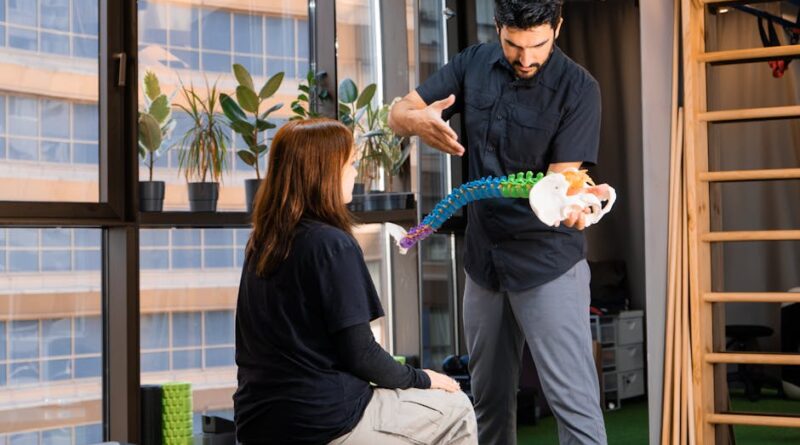The Role of Exercise in Spine Care
Did you know that nearly 80% of adults experience back pain at some point in their lives? That’s a staggering number! Many of us spend hours sitting, whether at work or home, which can lead to spine issues. But here’s some good news: exercise can play a crucial role in spine care. Lets explore how moving your body can help keep your spine healthy.
Why is Spine Health Important?

Your spine acts as the bodys backboneliterally! It supports your body, protects your spinal cord, and allows for movement. When your spine isn’t healthy, it can lead to pain and discomfort. This can affect your daily activities, making simple tasks feel overwhelming.
Taking care of your spine is vital. Good spine health means less pain and more mobility, allowing you to enjoy life to the fullest.
How Does Exercise Help Your Spine?

Exercise strengthens the muscles around your spine. These muscles support and stabilize your spine, helping prevent injuries. Think of them as a protective shield. Strengthening them reduces the risk of pain and enhances your overall posture.
But that’s not all! Exercise also:
- Improves flexibility
- Increases blood flow
- Helps maintain a healthy weight
When your body is flexible and well-circulated, it can adapt better to daily strains. This adaptability decreases the chances of experiencing back pain.
What Types of Exercise Are Best for Spine Care?

Not all exercises are created equal when it comes to spine health. Here are some types that are particularly beneficial:
Strength Training
Building muscle is key. Focus on exercises that strengthen your core, back, and abdominal muscles. Strong core muscles support your spine and improve balance.
- Planks
- Deadlifts
- Bridges
Stretching
Stretching improves flexibility and reduces tension. Regular stretching can help keep your back muscles long and relaxed.
- Hamstring stretches
- Cat-cow stretches
- Childs pose
Low-Impact Aerobic Exercises
Activities like walking, swimming, or cycling are fantastic for heart health and spine health. These exercises get your blood flowing without putting too much strain on your back.
How Much Exercise Do You Need?

Experts recommend at least 150 minutes of moderate aerobic activity each week. This can be broken down into manageable chunks. For example:
- 30 minutes a day, five days a week
- 15 minutes twice a day, five days a week
In addition to aerobic activity, include strength training exercises at least twice a week. This well-rounded approach will keep your spine strong and flexible.
Can You Exercise with Existing Back Pain?
If you already have back pain, you might wonder if exercise is safe. The short answer is yesbut with caution. It’s crucial to listen to your body. Here are some tips:
- Consult with a healthcare professional before starting any exercise program.
- Start slowly and gradually increase intensity.
- Focus on low-impact exercises to avoid aggravating your pain.
Many people find relief through gentle activities like yoga or water aerobics. These can help stretch and strengthen without causing strain.
Common Misconceptions About Exercise and Back Pain
Lets clear up some common myths about exercise and back pain:
Myth 1: Rest is Best
Many believe that resting is the best way to heal back pain. While a short rest can help, prolonged inactivity can worsen pain over time. Movement is essential for recovery!
Myth 2: All Exercises Are Bad for Your Back
Not all exercises are bad! The right exercises can strengthen your back and reduce pain. it’s all about finding what works for you.
Myth 3: You Must Work Out for Hours
Short, consistent workouts are just as effective as long sessions. Even 10-minute bursts of activity can help improve your spine health.
Tips for Staying Motivated
Staying active can be challenging. Here are some tips to keep you motivated:
- Set realistic goals. Start small and gradually increase.
- Find an exercise buddy. Working out with a friend can make it more enjoyable.
- Mix it up! Try different activities to keep things exciting.
- Track your progress. Celebrate small victories to stay motivated.
Conclusion: Take Action for Your Spine
Your spine is essential to your overall health. Regular exercise can strengthen your spine, improve flexibility, and reduce pain. Start incorporating movement into your daily routine. Remember, it doesnt have to be a workout at the gym; simple activities like walking or stretching can make a big difference.
Take the first step today! Talk to a healthcare professional, choose exercises that you enjoy, and make spine care a priority. Remember, your spine will thank you!
For more information on spine health and exercises, check out Spine-Health.com. You can also learn more about related topics in our post on Healthy Living Tips.



